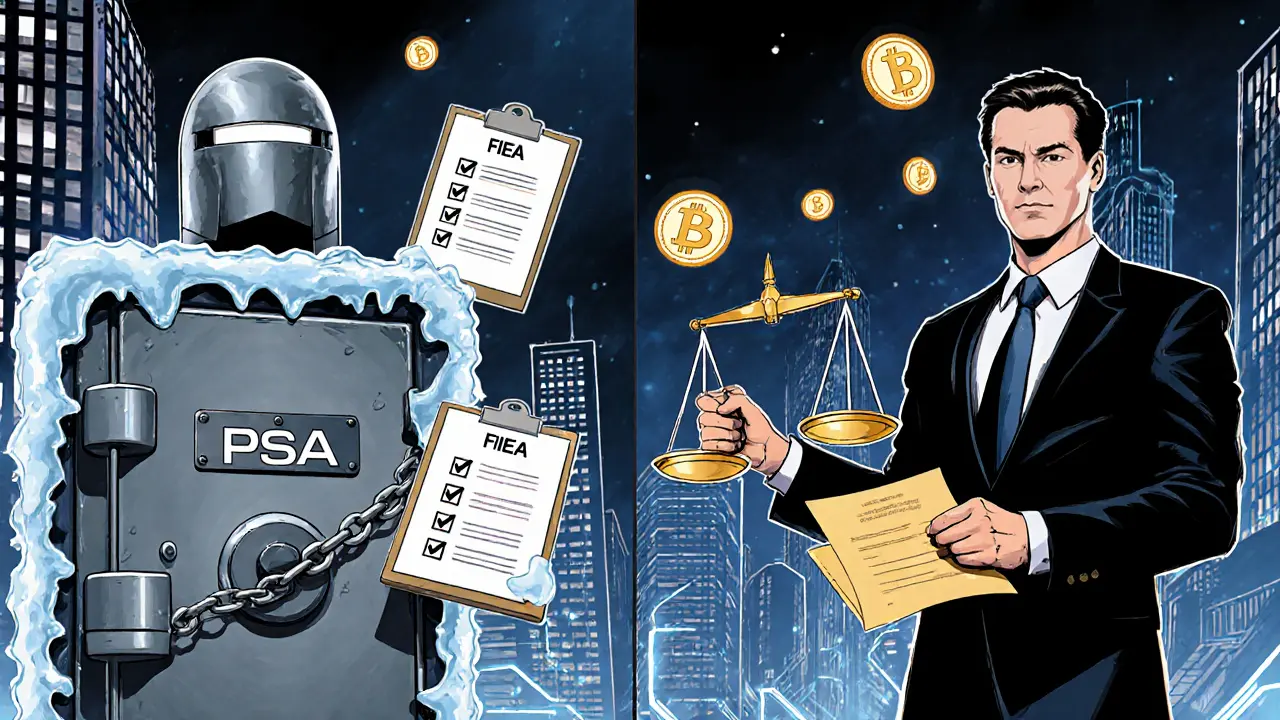FSA Compliance Cost Calculator
Calculate Your Compliance Costs
Estimate regulatory costs and trading fees based on your exchange's operational model and regulatory classification under Japan's FSA.
Estimated Compliance Costs
Key Requirements Comparison
When you hear the phrase FSA crypto regulation, think of a watchdog that turned a chaotic market into a global benchmark for security and investor protection. Financial Services Agency (FSA) is Japan’s primary financial regulator, and since the 2014 Mt. Gox collapse it has built one of the world’s toughest crypto compliance regimes. This article walks you through the two legal pillars behind the oversight, the recent shift toward the Financial Instruments and Exchange Act (FIEA), and what the rules mean for exchanges, token issuers, and everyday traders.
Why Japan’s Crypto Rules Matter
Japan was the first economy to recognize Bitcoin as legal tender, yet it didn’t stop there. The FSA paired acceptance with mandatory licensing, cold‑storage mandates, and rigorous AML/KYC standards. As a result, Japanese exchanges consistently rank among the safest globally, and the market has attracted institutional interest despite higher fees.
Core Legal Frameworks: PSA vs. FIEA
The oversight architecture rests on two statutes.
- Payment Services Act (PSA) - defines “crypto‑assets,” requires registration, physical presence, and 95% cold‑wallet storage of user funds.
- Financial Instruments and Exchange Act (FIEA) - traditionally covers securities; since 2025 it’s been expanded to cover tokens with investment‑like features.
The PSA governs the majority of exchange operations, while the FIEA adds a securities‑law layer for token offerings, insider‑trading rules, and market‑conduct standards.
| Aspect | Payment Services Act (PSA) | Financial Instruments and Exchange Act (FIEA) |
|---|---|---|
| Primary Focus | Crypto‑asset exchange operations | Securities and investment‑type tokens |
| Licensing Body | FSA registration as a Crypto‑Asset Exchange Service Provider (CAESP) | FSA registration as a securities business |
| Capital Reserve Requirement | Minimum 5% of net assets, plus operational capital | Higher equity ratio (typically 10‑15%) to protect investors |
| Customer Fund Segregation | At least 95% in offline cold wallets, fully segregated | Separate custodial accounts mandated, with regular audits |
| Disclosure Obligations | Basic white‑paper and security policy | Prospectus‑style disclosures, ongoing reporting, insider‑trading rules |
| Applicable Tokens | Utility and payment tokens | Tokens with voting rights, profit‑share, or investment expectations |
How the FSA Enforces Strict Compliance
Compliance isn’t a one‑time checkbox. Exchanges must submit a 200‑page registration dossier, undergo annual security audits, and report transaction logs in real time. The FSA also runs surprise inspections, and non‑compliant firms can face revocation of their license, heavy fines, or criminal prosecution.
Key enforcement tools include:
- Mandatory AML/KYC systems that flag transactions over ¥1million (≈ $7,000) and monitor for rapid asset movement.
- Cold‑storage requirements: at least 95% of customer holdings must sit in air‑gapped wallets, regularly tested by third‑party auditors.
- Segregated accounting: operational funds cannot be mixed with client deposits, and monthly reconciliations are submitted to the FSA.
- Capital adequacy monitoring: the regulator checks that exchanges maintain the required equity buffer at all times.
Failure to meet any of these standards can trigger a “Business Suspension Order,” which has crippled several low‑cost exchanges that tried to dodge the rules.

Impact on Crypto Exchanges and Token Issuers
For a new exchange, the road to full FSA registration typically takes 6‑12 months and costs 15‑20% of its operating budget. The expense shows up as higher trading fees-Japanese platforms charge 0.15‑0.20% per trade versus 0.05‑0.10% on less regulated venues.
Yet the upside is tangible. Users report fewer phishing incidents, and institutional investors view Japanese exchanges as “safe harbors.” Token issuers that fall under the FIEA enjoy clearer legal pathways to launch security token offerings (STOs) and can list spot Bitcoin ETFs on the Tokyo Stock Exchange with confidence that investor protection rules are in place.
The Role of Self‑Regulatory Organizations
Two industry bodies work hand‑in‑hand with the FSA:
- Japan Virtual Currency Exchange Association (JVCEA) - publishes best‑practice guidelines, runs a dispute‑resolution fund, and conducts quarterly compliance checks.
- Japan Security Token Offering Association (JSTOA) - focuses on token issuers, offering template prospectuses and legal counsel referrals.
These groups help lower the learning curve for newcomers and ensure that the FSA’s expectations are met consistently across the market.
Emerging Topics: DeFi, Stablecoins, and Future Bills
Despite the heavy regulatory focus on centralized exchanges, the FSA isn’t ignoring decentralised finance. A dedicated DeFi Study Group meets every two to three months with academics, industry players, and regulators to draft guidelines for smart‑contract‑based services.
Stablecoins are also on the radar. The September 2025 announcement to bring digital assets under the FIEA hints at future stablecoin licensing, likely requiring reserve audits similar to traditional money‑market funds.
Looking ahead, a formal bill slated for early 2026 will cement the FIEA reclassification, making Japan the first jurisdiction to treat investment‑type tokens exactly like securities. Analysts expect this move to set a global benchmark and push other regulators to adopt comparable frameworks.

Practical Checklist for Market Participants
If you’re planning to launch or operate in Japan, tick off these essentials:
- Establish a local legal entity with a physical address in Japan.
- Secure FSA registration as a Crypto‑Asset Exchange Service Provider (CAESP) (PSA) or as a securities business (FIEA) based on token classification.
- Implement AML/KYC tools that meet the ¥1million reporting threshold.
- Design cold‑storage infrastructure to keep ≥95% of user assets offline.
- Set up segregated accounting and conduct monthly reconciliations.
- Allocate at least 10-15% of equity as a capital buffer for FIEA‑regulated activities.
- Join JVCEA or JSTOA for ongoing compliance support.
- Prepare for annual security audits and real‑time transaction reporting.
Following this list can shave months off the registration timeline and keep you in the FSA’s good‑grace list.
Lessons for Other Jurisdictions
Regulators worldwide are studying Japan’s model. The clear separation between payment‑type tokens (PSA) and investment‑type tokens (FIEA) offers a template that avoids the “one‑size‑fits‑all” pitfalls seen elsewhere. Moreover, the partnership with self‑regulatory organizations shows how government can delegate day‑to‑day monitoring while retaining ultimate authority.
For crypto firms eyeing expansion, the takeaway is simple: compliance costs are a price worth paying for market credibility and long‑term sustainability.
Frequently Asked Questions
What is the difference between PSA and FIEA registration?
PSA covers general crypto‑asset exchanges, focusing on AML/KYC, cold storage, and fund segregation. FIEA applies when a token has investment characteristics, adding securities‑law obligations like prospectus disclosures, insider‑trading rules, and higher capital reserves.
How long does FSA registration typically take?
Preparing the dossier, passing security audits, and setting up compliance systems usually requires 6 to 12 months for a well‑prepared applicant.
Are Japanese exchange fees higher because of compliance?
Yes. The cost of maintaining 95% cold storage, segregation, and ongoing reporting translates into trading fees around 0.15‑0.20% per transaction, higher than many low‑regulation markets.
What happens if an exchange fails an FSA audit?
The FSA can issue a Business Suspension Order, levy fines up to ¥1billion, or revoke the license entirely, forcing the exchange to cease operations in Japan.
Will DeFi projects be allowed to operate under FSA rules?
The DeFi Study Group is drafting a sandbox framework. Early pilots suggest that DeFi protocols offering tokenized assets will need to register under the FIEA if those tokens are deemed securities.


ചഞ്ചൽ അനസൂയ
October 12, 2025 AT 08:29Seeing how the FSA pushes for tighter AML checks actually gives smaller exchanges a chance to level the playing field – they just need the right mindset.
Orlando Lucas
October 16, 2025 AT 23:36When we talk about regulatory rigor, it always starts with the question of why societies demand it. Japan’s FSA has built a framework that treats crypto almost like a regulated commodity, and that mindset reshapes market incentives. First, the capital reserve requirements force firms to hold a buffer, which in theory reduces the chance of a sudden collapse. Second, the cold‑storage mandate ensures that the majority of assets stay offline, limiting exposure to hacks. Third, the prospectus‑style disclosures bring a level of transparency usually reserved for public equities. All these pieces together create a cost structure that only the well‑capitalized can comfortably absorb. For a startup, the compliance spreadsheet quickly turns into a barrier to entry, which can be both protective and exclusionary. Traders, on the other hand, often notice tighter spreads because the market depth is confined to players who can meet the rules. This can lead to lower volatility in the short term, but it may also stifle innovation in the longer run. From a consumer‑protection angle, the FSA’s AML/KYC checks are meant to keep bad actors at bay, and that is a noble goal. However, the same checks can become a privacy concern for users who value anonymity. The fee differential-0.15‑0.20% for fully compliant platforms versus 0.05‑0.10% for looser setups-directly reflects the regulatory cost. If you run the numbers, the extra basis points add up quickly when you trade large volumes. In practice, many Japanese users have started to gravitate toward exchanges that can guarantee that their assets are both safe and legally sound. So while the FSA’s strict compliance does raise the bar, it also carves out a niche for trustworthy services that can thrive in a regulated environment.
Philip Smart
October 21, 2025 AT 14:43Looks like they just turned compliance into a money‑grab.
Jacob Moore
October 26, 2025 AT 04:49Yo, if you’re looking to jump into the Japanese market, the best move is to partner with a local compliance consultancy – they’ll walk you through the FSA checklist and save you weeks of headache.
Emily Kondrk
October 30, 2025 AT 19:56Everyone pretends the FSA is just about consumer safety, but deep down it’s a covert operation to funnel crypto profits straight into the government’s shadow vaults. The whole thing reeks of a grand surveillance scheme.
Nathan Van Myall
November 4, 2025 AT 11:03The capital reserve numbers aren’t random; they’re calibrated to match the risk weight of crypto assets, meaning firms can’t over‑leverage without triggering extra supervisory scrutiny.
debby martha
November 9, 2025 AT 02:09i guess its just another hopscotch rule that makes life harder for the little guys.
Ted Lucas
November 13, 2025 AT 17:16Exactly! The extra compliance fees are like a toll road – you pay to keep the potholes from swallowing your coins 🚀💸.
mark noopa
November 18, 2025 AT 08:23In the grand tapestry of financial evolution, regulation serves as the loom that keeps threads from unraveling. Japan’s FSA, with its meticulous approach, is essentially the master weaver. By demanding cold storage, they force the fabric to be more resilient against the jagged needles of hackers. The capital reserve clause adds weight, preventing the cloth from floating away on speculative winds. Yet, every loom requires tension; too tight and the yarn snaps. This tension translates into higher operational costs for exchanges. The market reacts by pruning the weaker strands, leaving only the strongest fibers. Thus, the regulatory pattern both protects and shapes the emerging crypto textile.
Rama Julianto
November 22, 2025 AT 23:29If you need a quick starter kit, focus on the 95 % cold‑storage rule first – it’s the single biggest factor that the FSA audits and the easiest to implement with a reputable custodial service.
Helen Fitzgerald
November 27, 2025 AT 14:36Hey folks, just a heads‑up: the FSA’s KYC forms have been updated to accept digital IDs, so the onboarding process is actually smoother than it used to be.
Mureil Stueber
December 2, 2025 AT 05:43The fee spread isn’t magic; it reflects the cost of the audit trail and the legal counsel you need to keep on retainer.
Leo McCloskey
December 6, 2025 AT 20:49Honestly, if you think that the FSA’s guidelines are optional, you’re living in a fantasy world-compliance isn’t a suggestion; it’s the law!!!
arnab nath
December 11, 2025 AT 11:56Fact: the FSA looks at annual transaction volume when setting the capital reserve percentage, not your personal opinion.
gayle Smith
December 16, 2025 AT 03:03Drama alert! The moment they announced the new reserve ratio, the entire crypto community went into a collective panic, like it was the end of the world!
Nina Hall
December 20, 2025 AT 18:09Stay positive, everyone! Higher compliance means more trust, and trust means more users joining the platform – it’s a win‑win scenario.
Manas Patil
December 25, 2025 AT 09:16From a cross‑border perspective, aligning with FSA standards actually smooths the path for Asian‑European liquidity pipelines, which is huge for market depth.
Ethan Chambers
December 30, 2025 AT 00:23One must ask whether the average trader truly appreciates the subtle elegance of a 0.20 % fee structure, or merely laments the loss of cheap arbitrage opportunities.
Carol Fisher
January 3, 2026 AT 15:29Our nation’s financial sovereignty depends on strict oversight; any laxity would let foreign entities bleed our economy dry.
Melanie Birt
January 8, 2026 AT 06:36Exactly, the compliance budget is an investment in credibility 😊 – without it, even the best tech can be dismissed as a scam.
Lady Celeste
January 12, 2026 AT 21:43The FSA’s rules are just bureaucratic noise that stifles real innovation.
Scott Hall
January 17, 2026 AT 12:49I get where people are coming from, but the data shows that markets with solid oversight actually attract more institutional capital over time.